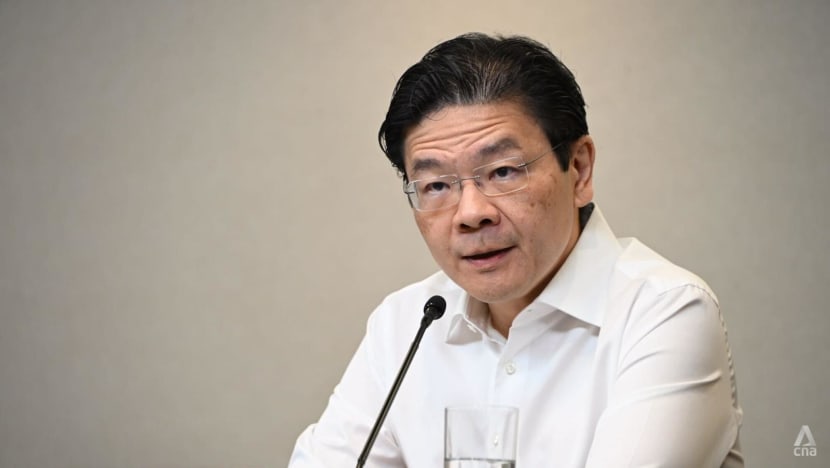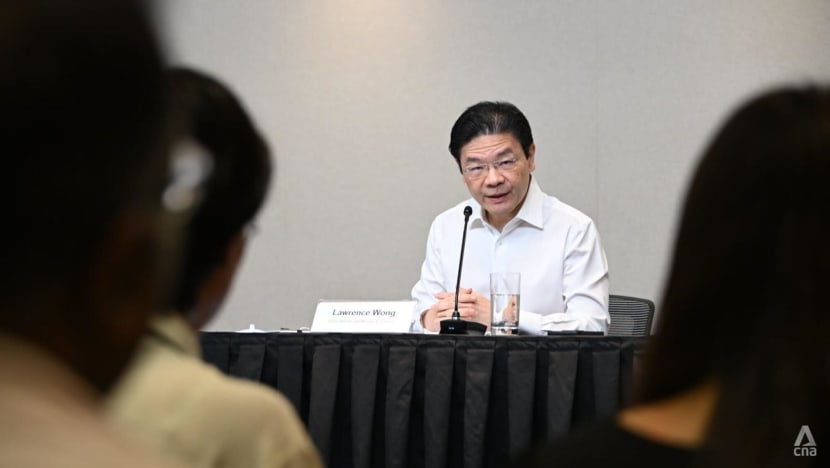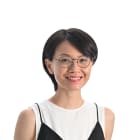GE2025: Foreigners urging Singaporeans to vote along religious lines 'crosses the line', says PM Wong
"Singapore's politics must be for Singaporeans alone to decide," says Prime Minister Lawrence Wong, calling on all political parties to reject foreign influence and identity politics.

Prime Minister Lawrence Wong speaks to the media during a press conference at the National Press Centre on Apr 26, 2025. (Photo: CNA/Christine Tan)

This audio is generated by an AI tool.
SINGAPORE: Foreigners urging Singaporeans to vote along religious lines have "crossed the line", said Prime Minister Lawrence Wong on Saturday (Apr 26), stressing that external actors must not be allowed to exploit divisions within the country.
At a press conference at the National Press Centre, Mr Wong welcomed the "clear consensus" from opposition parties rejecting foreign interference in Singapore's elections. He urged all political leaders to also firmly reject overseas endorsements.
Mr Wong said he is holding the press conference in the middle of GE2025 campaigning, in his position as Prime Minister, as the issue concerns "a matter of national interest".
His remarks follow the government's announcement on Friday that it directed Meta to block access to Facebook posts made by two Malaysian politicians and a former Internal Security Act detainee, now an Australian citizen. The posts criticised Singapore’s handling of religious matters and urged voters to cast ballots along religious lines.
Mr Wong said the foreign actors’ online activities specifically urged Singaporeans to vote for certain candidates in GE2025 based on race or religion. These posts, he added, were widely shared within the Singaporean community.
"Singaporeans may have different views about issues, but we cannot allow external actors to exploit whatever differences we may have to weaken us or to advance their own interests," he said. “Singapore's politics must be for Singaporeans alone to decide.”
He added that access to the posts had been blocked and warned that the government would continue to act firmly against such activities.
Under the Parliamentary Elections Act, it is an offence for foreigners to participate in election activities or to publish online election advertising. The Act defines such advertising as material that can "reasonably" be regarded as intending to promote or prejudice the electoral success of a party or candidate.
RACE, RELIGION AND IDENTITY POLITICS
Beyond foreign interference, Mr Wong also raised concerns about other social media posts attempting to bring race and religion into politics – including one by a local activist calling for Muslims to vote for candidates who are willing to advance a religious agenda.
He did not name the activist but Islamic religious teacher Noor Deros had in recent days put up social media posts sparking debate about the mixing of religion and politics. In one of his posts, for example, he made a list of demands to Singapore's politicians and claimed to have met the Workers' Party's Malay candidates.
“These messages may be by Singaporeans, but we should also reject them. Were it a Christian, a Hindu or Buddhist group making the same demand, our response would be the same,” he said.
Mixing politics with religion, he stressed, is unacceptable in Singapore for three reasons: It fractures the common space shared by all Singaporeans, all communities are worse off when elections become contests of faith and external powers will exploit fault lines to advance their own agenda.
This does not mean that Singapore cannot engage different communities or discuss race and religion, Mr Wong said. Such engagements are important, but they are "very different from identity politics", which should be firmly rejected.
He described identity politics as dangerous as it encourages candidates and MPs to appeal for support based on race or religion, championing the interests of one group over others.
“When one group jostles aggressively to assert its identity, others will organise and start to jostle back, and you can see how these play out in countries everywhere,” said Mr Wong.
“The minority groups will fail to get what they want, because the majority group will push back strongly and the minorities will find their space constricted. At the same time, the majority group will also live in the most unhappy society where every issue comes down to race and religion.
“So no one is happy, no one wins. In the end, we will be more divided than before and Singaporeans, all of us, will pay the price.”
OPPOSITION PARTIES' RESPONSE
Mr Wong called on all political parties to make their positions clear – not only on foreign interference, but also on two fundamental principles: that identity politics has no place in Singapore and religion should never be mixed with politics.
“At the end of the day, whatever differences, we are all Singaporeans first and foremost,” he said.
Opposition party leaders also spoke out on Saturday against foreign interference in the election.
The Workers' Party stated that it has no control over foreigners supporting its candidates and clarified that no promises, commitments or agreements were made to Mr Noor – or anyone else – in exchange for political support.
Mr Wong said that statements from various political leaders indicate a “clear consensus” on rejecting foreign interference.
“I think that's good. I welcome that,” said the Prime Minister, while urging all political parties to “clearly and categorically reject” any endorsements or support from overseas entities or individuals.
“We cannot control what other people say, fair enough. But should such endorsements or show of support come about, I would like to suggest and call on all parties to clearly and categorically reject these endorsements because the fundamental principle is foreigners should not decide the outcome of our elections.”
He also cautioned that issues beyond elections – such as foreign policy positions – could undermine Singapore’s national interest.
Citing Mr Noor’s posts, Mr Wong said the religious teacher had taken “very extreme positions on foreign policy”, such as calling America and Israel “the masterminds of terrorism”.
Mr Noor, who is Singaporean but based in Malaysia, had also advocated expanding Islamic principles “at the expense of shrinking the common space that other faiths and communities in Singapore share”, he said.
“These are positions that will go against our national interest,” said Mr Wong.
If the People's Action Party leaders were to interact with people like him, they would "make it quite clear" that they disagree and will not support such positions, both privately and publicly, he added.
“Likewise, I would encourage and call on all political parties to do the same.”

ENGAGING COMMUNITIES, SAFEGUARDS IN PLACE
In a multiracial and multireligious society like Singapore, it is often harder to be a minority, Mr Wong acknowledged.
“We recognise that. So we must make a greater effort to engage all the different communities,” he said.
MPs regularly engage with various communities, listen to concerns and raise them when needed, including in parliament, he added.
When asked whether he was concerned about the incident affecting relationships between ethnic groups – particularly in areas like Tampines with larger Malay-Muslim communities – Mr Wong said the government’s swift action was driven by a commitment to protecting social harmony, not political concerns.
“It is precisely because we are worried, not about the consequences about the election, but worried about the impact on our social harmony that we are taking action.”
Reiterating that the press conference was “not a political” event, Mr Wong said: “I’m not here to talk about my concerns about the party. I’m here to talk about my concerns for Singapore and our country.”
He added that the responses from political parties so far have been encouraging. “It seems like everyone agrees,” he said.
If all parties stay aligned and reject foreign interference not just in words but in actions over the coming days, his concerns would be addressed, Mr Wong said.
“And we can continue to have our election campaign, Singaporeans can choose and we can do so knowing that our cohesion or harmony will not be undermined.”
Mr Wong was asked by CNA whether there are other entities that are a cause for concern when it comes to foreign influence during the GE - for example, the Critical Spectator Facebook page run by Mr Michael Petraeus, a Polish national in Singapore.
In response, Mr Wong reiterated that it is Singaporeans who must decide the outcome of the election.
Safeguards are in place to ensure this, he said.
“It doesn't mean that foreigners cannot write about elections, to be very clear. Foreign journalists report on elections all the time and that is allowed.
“But when foreigners take a position on an issue or a candidate and push for an issue or candidate, one over the other, and especially when it is about race and religion and you start mixing race and religion into politics – that crosses the line.”
The government will continue to monitor the situation, said Mr Wong, noting that there are many posts and comments online.
“But if anything crosses the line, we will certainly take action. We will apply the rules even handedly, across the board. We will apply them fairly without fear or favour," he added.




















